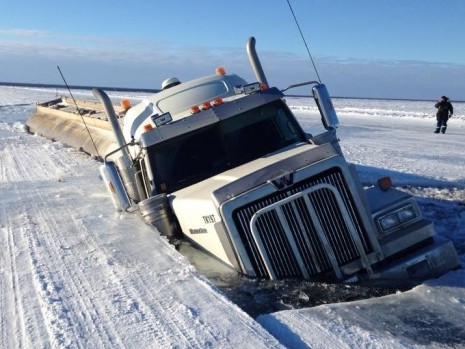Giant metaphor crashes through the ice on Canada’s Great Bear Ice Crossing

 An 80-thousand pound metaphor crashed through the ice on the Northwest Territories’ Great Bear Ice Crossing on Saturday in the form of an off-white Western Star fuel tanker.
An 80-thousand pound metaphor crashed through the ice on the Northwest Territories’ Great Bear Ice Crossing on Saturday in the form of an off-white Western Star fuel tanker.
The CBC reports that the tanker was carrying heating fuel to Deline, a town of about 500 near the Great Bear Lake. The accident happened just three days after the territory’s transportation department raised the allowable weight on the Great Bear Ice Crossing from 10,000 kilograms to 40,000.
The truck is currently semi-submerged in the top portion of the ice, which one official estimates to be between 100 and 120 centimetres thick. No one was injured in the incident.
The symbolism of a fuel truck trapped in the ice in Canada’s north will not be lost on anyone who follows news from the scientific community about climate change.
Recent data from the NASA and the National Oceanic and Atmospheric Administration confirms that global warning is particularly intense in the Arctic —a phenomenon referred to as “Arctic amplification”. In January, scientists confirmed a record low level for Arctic sea ice. And the data for January was particularly worrying.
“We’ve looked at the average January temperatures, and we look at what we call the 925 millibar level, about 3,000 feet up in the atmosphere,” says Mark Serreze, director of the National Snow and Ice Data Center. “And it was, I would say, absurdly warm across the entire Arctic Ocean.”
Canada has 5400 kilometres of ice roads, and they have provided a vital link not only for the approximately 43,000 resident of the Northwest Territories, but also for the important diamond mining industry. But researchers from the University of California, Los Angeles say that just 13 per cent of these routes may be accessible by 2050.
The United Nations reports that, due to man made emissions, it is likely that global temperatures will increase by as much as 4.8 Celsius by the end of the 21st Century. Some believe the effects of such a shift will include severe storms, drought, even a plunge in global food output.
But some scientists have an even bigger fear: permafrost.
“There is a lot of carbon frozen in the Arctic soil’s permafrost layer,” says Neil Sturchio, professor and chair of the University of Delaware’s Department of Geological Sciences. “If this all thaws out, prevailing thought is that the carbon in the soil could be released to the atmosphere and potentially accelerate global warming.”
Canada has 5400 kilometres of ice roads, and they have provided a vital link not only for the approximately 43,000 resident of the Northwest Territories, but also for the important diamond mining industry. But researchers from the University of California, Los Angeles say that just 13 per cent of these routes may be accessible by 2050.
This year, the opening of the famed Tibbitt-to-Contwoyto Winter Road, which has been open since 1982, was delayed this year. And the heaviest loads are being delayed until later this month, when the ice is expected to be at its thickest.
Meanwhile back in Deline, transportation crews are looking to find a detour to the isolated town, whose name is derived from the First Nation term for “where the waters flow.”
Nick Waddell
Founder of Cantech Letter
Cantech Letter founder and editor Nick Waddell has lived in five Canadian provinces and is proud of his country's often overlooked contributions to the world of science and technology. Waddell takes a regular shift on the Canadian media circuit, making appearances on CTV, CBC and BNN, and contributing to publications such as Canadian Business and Business Insider.
